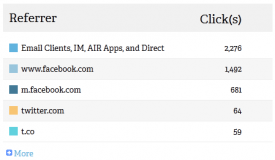How to spy on campaigns of competitors who use URL shorteners


URL shorteners are such a wonderful thing: they not only make URLs shorter (obviously), but they also give away some juicy details from those who use them when pushing online campaigns. Services like bit.ly, goo.gl, and others, provide publicly-viewable statistics you can often gleen valuable insight from. In this post, I'm going not only dive into some great URL shortener research methods, but I'm also going to show you how to use Google to find some of these links from your competitors! Results will inevitably vary, but the methods should still prove useful, regardless.
Beginning with URL shorteners, the concept is simple enough: add a + to the end of a bit.ly or goo.gl URL and see what kind of data there is to be found. For example, add a + onto the end of http://goo.gl/ONjPr, and you'll get http://goo.gl/ONjPr+. Additionally, for bit.ly, take a link like http://bit.ly/zjkC68, then add a + onto the end of it to get http://bit.ly/zjkC68+. Also worth mentioning, adding a + onto the end of those URLs is a great way to see where they actually lead to before you ever click them.
For other URL shortners, you can try just adding a + onto the end of their URLs to see if they work. If not, then either go to their main site to see if they provide analytics for their URLs, or simply use the site to create your own shortened URL, then take note of what they change with the URL to show analytics (if they show analytics). I'm mentioning this now because it might come in handy for you when utilizing some of the searches I delve into below.
Now, personally, I like seeing what kind of traffic spammers get with campaigns they spam on Facebook. As one who dabbles in affiliate marketing, some of the data I discover from spam Facebook campaigns can tell me quite a bit about a number of factors, such as regional targeting, click-through rates, and more. For instance, recently, a spammer commented on a celebrity's Facebook page that I follow. Their comment contained a link which pointed to a page where they could "win a free iPad." Lucky for me, the link was a bit.ly link, so I added a + onto the end of it and kept track of it for around a month. The results were very interesting.
First, they only used that particular link on Facebook. I was able to discern this from referrer data in bit.ly's analytics (all the clicks came from Facebook). Also, they only posted the link at certain times on random days, and clicks fell off just as quickly as they rolled in. Interestingly, the campaign garnered some 7,000 click-throughs in the month that I kept track of it. That's astonishing, considering how one might think those types of spammy iPad campaigns would be ignored by every person who sees them.
Now, for what I consider to be the truly fun part of this: finding goo.gl and bit.ly links from your competitors, based on keywords or campaigns you're interested in.
First, pick a keyword (or multiple keywords) you're interested in. Next, pick a competitor. For my example below, I'll use Microsoft as the company, and the keywords "contest" and "win." Check out the following query (click it to see it in Google):
site:microsoft.com intext:goo.gl | intext:bit.ly Contest "win *"
If you're unfamiliar with searching Google in this manner, what I'm telling the search engine is to return results from only microsoft.com, where "goo.gl" or "bit.ly" are somewhere in the text of the page. Additionally, I want the words "contest" to be present, along with "win *," where the * represents a wild card. Basically, I'm looking for contests Microsoft may have had where they used bit.ly or goo.gl links. Naturally, you could be way more specific with what you're seeking, but sometimes, it's best to start broad, then refine as you go.
Here's one result, where Microsoft Philippines had a contest that gave "Filipinos the chance to travel to New York and witness the breathtaking performances of official X-MEN: First Class stunt coordinators by simply using Windows Live Hotmail and Microsoft Office Web Apps." Since we see that they used bit.ly to run their campaign with, we can do our little + trick and see how many clicks they garnered, where most of them came from, etc.
Pretty nifty, huh? Take some time sometime to brainstorm some creative searches to help you get the low-down on some of your competitors' online campaigns! You won't always be successful with specific searches, so always remember to start broad if necessary, then work your way down to the specifics. For example, before you start digging too deep, you may want to see if your competitors' sites even have any goo.gl or bit.ly links in the first place! Dipping back to our original search query, you could run this to start:
site:microsoft.com intext:goo.gl | intext:bit.ly
154,000 results. That's quite a solid basis for adding in keywords, so you'd be in luck here.
Last of note, there are custom bit.ly URLs that many sites employ. For example, ZDNet has its own bit.ly shortening service: zd.net. You can see what the URLs look like on the ZDNet Twitter feed. As with bit.ly links, you can simply add a + onto the end of a zd.net link (or whatever other site you might find) and see data for it. you could even change the zd.net part to bit.ly, and the URL would still work!
In conclusion, this is meant to be just one of many techniques in your competition research toolkit. It's great for getting contest ideas, gathering metrics on specific data points from competitors, gauging how well a competitor's campaign is doing, etc. Again, take some time to see how this technique might be useful to you. You may just find it to come in handy sometime!